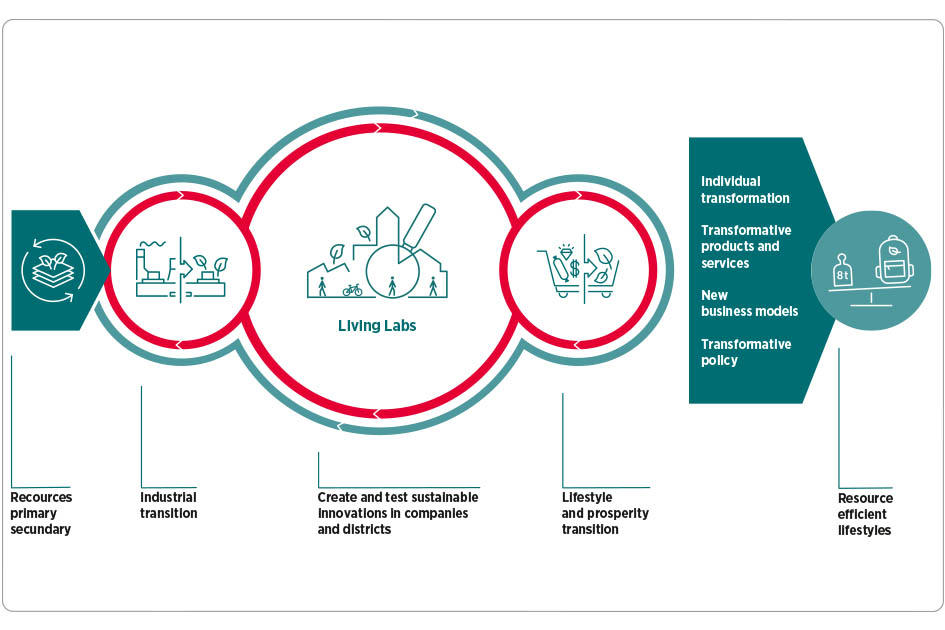Innovation Labs
The Research Unit Innovation Labs analyses, monitors and designs innovation processes for sustainable products, services, and business models and supports social interventions, particularly in companies and neighbourhoods.
Technical, social, and regulatory innovations are needed to decouple the development of prosperity in society and economic growth from resource consumption. These innovations increase the efficiency of resource use, reduce environmental pollution, and offer a high quality of life.
Aims and objectives
How can social and socio-technical innovations be designed in a user-integrated way to change production and consumption patterns with regard to a climate-neutral and resource light society and the 1.5-degree objective? This is the focal question addressed by researchers in the Research Unit Innovation Labs. The aim of their research is to accelerate social and socio-technical innovation processes as well as product-service and market development for sustainable production and consumption, and to promote the necessary skills and education for sustainability (EfS). In doing so, they pursue the vision of a sustainable, resource-light economy and society in which products and services offer a high quality of life, are fairly produced globally or locally, and protect the environment.
The focus is on a market-oriented, resource-efficient and socio-technical design of an industry, affluence, and consumption turnaround through innovative, resource-light product-services designs – in terms of the 1.5-degree target and a climate-neutral and resource light society. In this case, only eight instead of the previous 30 to 35 tonnes of natural resources will be extracted from the environment per person and year.
The scientists' fundamental approach is research in real-world laboratories. Stakeholders from science and practice work together in collaborative, intervention-oriented research in order to develop and test joint solutions for an actual, existing sustainability problem. In particular, the researchers pursue the innovation approach of "Sustainable Living Labs". This approach aims at the actor and user-integrated development and design of products and services in a real-world environment.
Living Labs are places of innovation with a high real-world relatedness. Within them, business models, products, and services are developed and optimised – from the idea to the practical application – in close cooperation with manufacturers, customers and other actors in the value chain. The early consideration of users and their needs as well as their context and application knowledge reduces development risks and accelerates the process of innovation and diffusion - this is an essential factor for the acceptance and market success of sustainable products and business, consumption, and prosperity models.
At the level of neighbourhoods and cities, social innovations in particular play a major role, in addition to resource-lighter, sustainable product-service offers. In the light of the Corona pandemic, it became clear that the resilience of the social interaction structures of districts and cities is crucial for a good and sustainable life in the neighbourhood.
The design – such as social design, participatory design, service design, and experience design – of new resource- and energy-efficient solutions leads to changes in consumption and production styles through social and socio-technical innovations. It also increases the potential for efficiency, consistency, and sufficiency and helps to shape sustainable transformation in value chains, cities, and neighbourhoods. This is where "transition design" comes in.

Thematic focus
The Research Unit addresses three central research topics:
- Designing municipal real-world laboratories
To achieve "a good life in the neighbourhood" urban transformation processes, resilience and sustainability management as well as social innovations are analysed and shaped sustainably using approaches of urban design. - Aligning entrepreneurial innovations
Digital product service systems and business models are developed in a user-integrated manner using the Living Lab approach. In addition, innovation management in companies is accompanied and designed with a focus on sustainability. - Promoting competences and infrastructures
Learning and educational concepts are analysed and developed to enable transformative learning, especially in real-world laboratories and living labs; strategies and network development for sustainable research and innovation infrastructures are initiated and accompanied.
Publi-cations
You find all scientific publications on our publication server:
Projects
Here you can find projects of the Research Unit:
